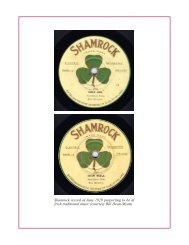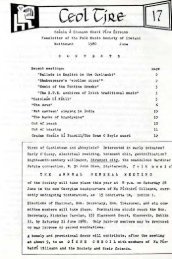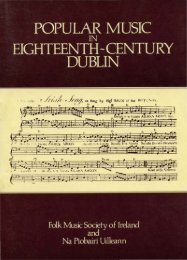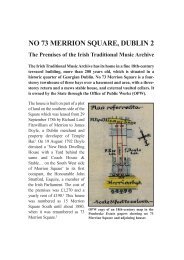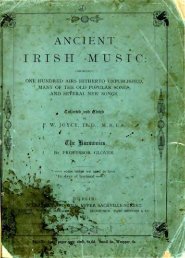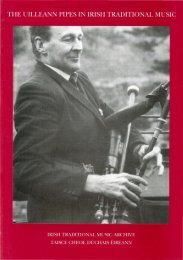Union Pipes - Irish Traditional Music Archive
Union Pipes - Irish Traditional Music Archive
Union Pipes - Irish Traditional Music Archive
Create successful ePaper yourself
Turn your PDF publications into a flip-book with our unique Google optimized e-Paper software.
57 COURTNEY’S ‘UNION PIPES’ AND THE TERMINOLOGY OF IRISH BELLOWS-BLOWN BAGPIPES<br />
What seems from The Times of 15 May 1788 to be Courtney’s<br />
understanding of his imprecise new term may not have been<br />
understood even by those pipers who used it immediately after his<br />
death. Certainly none of them, not even those who edited or<br />
published music books in the next ten or so years, give any<br />
explanation for it. But they continued to use it because for them also<br />
it was a usefully neutral term, and a prestigious term, one that had<br />
received approval at the highest social levels. It was a label<br />
associated with a hitherto unachieved level of public professional<br />
success for a bagpiper, and it would be strange if they were to<br />
discard it, especially since ‘union’ did not at first have the negative<br />
political connotations that it would later take on in Ireland. Even<br />
when it had, it was by then a well established term that had created<br />
its own tradition. As will be seen, pipers associated its use with their<br />
predecessors, and developed a loyalty to it that lasted well into the<br />
twentieth century. Nevertheless, it would appear that while it soon<br />
became an established term, it was one with no firm established<br />
meaning, and one that was ripe therefore for having further meanings<br />
assigned to it.<br />
Act of <strong>Union</strong> 1800<br />
It has occasionally been said that the union pipes derived their name<br />
from the <strong>Irish</strong> Act of <strong>Union</strong> of 1800, which abolished the <strong>Irish</strong><br />
parliament in Dublin and provided Ireland instead with reduced<br />
political representation from Westminster. 163 The Act was brought<br />
into effect by bribery and corruption rather than by consent, and it<br />
led to more than a hundred years of economic, social and political<br />
163<br />
For example, ‘The name of <strong>Union</strong> pipes probably originated from the<br />
instrument having appeared about the time of union of the <strong>Irish</strong> and English<br />
parliaments...’ (Day 1891: 55); and more influentially but also more tentatively:<br />
‘These [<strong>Irish</strong> <strong>Pipes</strong>] were called <strong>Union</strong> <strong>Pipes</strong>, either as immortalising the<br />
legislative <strong>Union</strong> of Great Britain and Ireland in 1801, or more probably from a<br />
mistaken rendering of the native name Uilleann or “elbow” pipes’ (Galpin 1911:<br />
179).



